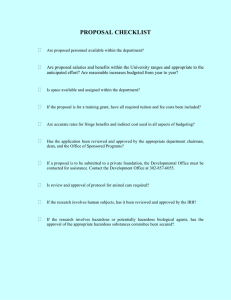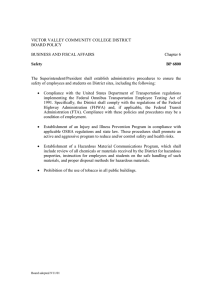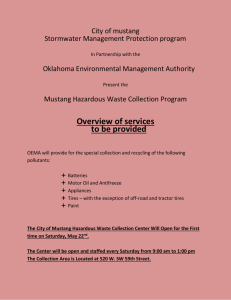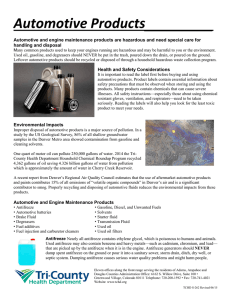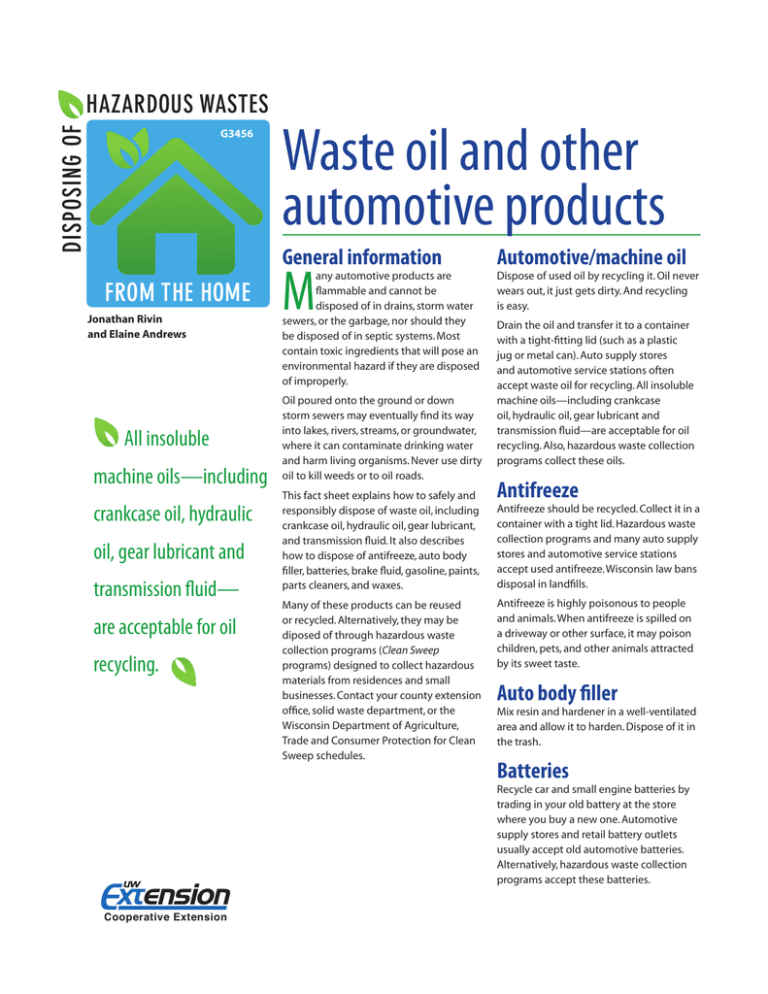
DISPOSING OF
HAZARDOUS WASTES
G3456
FROM THE HOME
Jonathan Rivin
and Elaine Andrews
All insoluble
machine oils—including
crankcase oil, hydraulic
oil, gear lubricant and
transmission fluid—
are acceptable for oil
recycling.
Waste oil and other
automotive products
General information
Automotive/machine oil
any automotive products are
flammable and cannot be
disposed of in drains, storm water
sewers, or the garbage, nor should they
be disposed of in septic systems. Most
contain toxic ingredients that will pose an
environmental hazard if they are disposed
of improperly.
Dispose of used oil by recycling it. Oil never
wears out, it just gets dirty. And recycling
is easy.
M
Oil poured onto the ground or down
storm sewers may eventually find its way
into lakes, rivers, streams, or groundwater,
where it can contaminate drinking water
and harm living organisms. Never use dirty
oil to kill weeds or to oil roads.
This fact sheet explains how to safely and
responsibly dispose of waste oil, including
crankcase oil, hydraulic oil, gear lubricant,
and transmission fluid. It also describes
how to dispose of antifreeze, auto body
filler, batteries, brake fluid, gasoline, paints,
parts cleaners, and waxes.
Many of these products can be reused
or recycled. Alternatively, they may be
diposed of through hazardous waste
collection programs (Clean Sweep
programs) designed to collect hazardous
materials from residences and small
businesses. Contact your county extension
office, solid waste department, or the
Wisconsin Department of Agriculture,
Trade and Consumer Protection for Clean
Sweep schedules.
Drain the oil and transfer it to a container
with a tight-fitting lid (such as a plastic
jug or metal can). Auto supply stores
and automotive service stations often
accept waste oil for recycling. All insoluble
machine oils—including crankcase
oil, hydraulic oil, gear lubricant and
transmission fluid—are acceptable for oil
recycling. Also, hazardous waste collection
programs collect these oils.
Antifreeze
Antifreeze should be recycled. Collect it in a
container with a tight lid. Hazardous waste
collection programs and many auto supply
stores and automotive service stations
accept used antifreeze. Wisconsin law bans
disposal in landfills.
Antifreeze is highly poisonous to people
and animals. When antifreeze is spilled on
a driveway or other surface, it may poison
children, pets, and other animals attracted
by its sweet taste.
Auto body filler
Mix resin and hardener in a well-ventilated
area and allow it to harden. Dispose of it in
the trash.
Batteries
Recycle car and small engine batteries by
trading in your old battery at the store
where you buy a new one. Automotive
supply stores and retail battery outlets
usually accept old automotive batteries.
Alternatively, hazardous waste collection
programs accept these batteries.
Cooperative Extension
W A S T E
O I L
A N D
O T H E R
Car batteries may contain strong acids that
can cause severe burns. Most batteries also
contain lead or other hazardous metals.
Wisconsin law bans disposal of lead-acid
(automotive) batteries in landfills.
Brake fluid
Brake fluid should be collected in a
container with a tight lid and taken to a
collection site that accepts brake fluid.
Contaminated gasoline
Recycle contaminated gasoline by letting
the solid contaminants and water settle,
then carefully pouring off the gasoline. Use
the recycled gasoline in small engines (not
automobiles) by gradually mixing small
quantities with clean gasoline. A ratio of
one part contaminated to five parts clean
should work well. Commercial gasoline
recycling is available in some communities
where a solvent recycling business is
located.
Gasoline is extremely flammable. Do
not use gasoline as a cleaner or solvent.
Instead, use a parts cleaner that has a lower
flammability rating, or use a product with
a low hazard rating, such as a detergent.
When buying parts cleaners, look for
signal words—CAUTION, WARNING, and
DANGER—to help you decide which
product to buy.
Because it is highly flammable, do not
use gasoline to kill weeds, and do not mix
gasoline with waste oil. If you need to store
gasoline, store it only in small amounts
and in specially constructed gas cans. Do
not dispose of gasoline in trash or down a
drain.
A U T O M O T I V E
P R O D U C T S
Parts cleaner, auto paint, Houshold hazardous waste
collection programs
car polish, and wax
Home and farm products that contain
Use up large leftover quantities of these
products by sharing them with neighbors,
with high school or technical school auto
classes, or with service stations.
Parts cleaners, paints, polishes, and waxes
are flammable and toxic, so do not throw
them in the trash or down a drain. Very
small quantities of liquids can be disposed
of by evaporating them. More viscous
products such as paints, polishes, and
waxes can be hardened. Hardening locks
the chemicals into a solid mass which can
then be put in the trash.
How to harden products
or evaporate small amounts
of liquid
• Move the container to a sheltered,
secure outdoor area away from flames,
children, and pets.
• Open the lid and allow the liquid or
paste to dry.
• Discard the hardened material in the
trash.
How to dispose of aerosol cans
chemical hazards can be taken to countyrun hazardous materials collection facilities
operating Clean Sweep programs. Some
counties have permanent collection
facilities and others have facilities that
operate intermittently. Contact your
county office or the Wisconsin Department
of Agriculture, Trade and Consumer
Protection (608-224-4545) for collection
schedules. Alternatively, contact a private
hazardous waste hauler who will make
individual pickups for a fee.
For more information
Solid & Hazardous Waste Education Center
www4.uwm.edu/shwec/
715-346-2793
Wisconsin Department of Agriculture,
Trade and Consumer Protection
http://datcp.wi.gov/Environment/
Clean_Sweep/index.aspx
608-224-4545
Wisconsin Department of Natural
Resources http://dnr.wi.gov/
608-266-2621
University of Wisconsin-Extension
publications
Disposing of Hazardous Wastes from the
Home: Home and Garden Pesticides
(G3453)
Cleaners and polishes in aerosol cans need
special attention during disposal. Partially
full aerosol cans may explode when hot. If
you can’t use or share your aerosol product, Disposing of Hazardous Wastes from the
ensure there is a cap to cover the spray
Home: Paints, Solvents, and Other Home
nozzle and store the can in a cool location
Improvement Products (G3454)
until you can properly dispose if it at a
hazardous waste collection site.
Copyright © 2012 by the Board of Regents of the University of Wisconsin System doing business as the division of Cooperative Extension of
the University of Wisconsin-Extension. All rights reserved. Send copyright inquiries to: Cooperative Extension Publishing, 432 N. Lake St., Rm.
227, Madison, WI 53706, pubs@uwex.edu.
Authors: Jonathan Rivin is a waste management specialist with the UW Extension Solid & Hazardous Waste Education Center. Elaine Andrews is
emeritus director UW Environmental Resources Center and UWEX environmental education specialist.
Cooperative Extension publications are subject to peer review.
University of Wisconsin-Extension, Cooperative Extension, in cooperation with the U.S. Department of Agriculture and Wisconsin counties,
publishes this information to further the purpose of the May 8 and June 30, 1914, Acts of Congress. An EEO/AA employer, the University of
Wisconsin-Extension, Cooperative Extension provides equal opportunities in employment and programming, including Title IX and ADA
requirements. If you need this information in an alternative format, contact Equal Opportunity and Diversity Programs, University of WisconsinExtension, 432 N. Lake St., Rm. 501, Madison, WI 53706, diversity@uwex.edu, phone: (608) 262-0277, fax: (608) 262-8404, TTY: 711 Wisconsin Relay.
This publication is available from your county UW-Extension office (www.uwex.edu/ces/cty) or from Cooperative Extension Publishing. To
order, call toll-free 1-877-947-7827 (WIS-PUBS) or visit our website: learningstore.uwex.edu.
Disposing of Hazardous Wastes from the Home: Waste Oil And Other Automotive Products (G3456) R-06-2012
2

